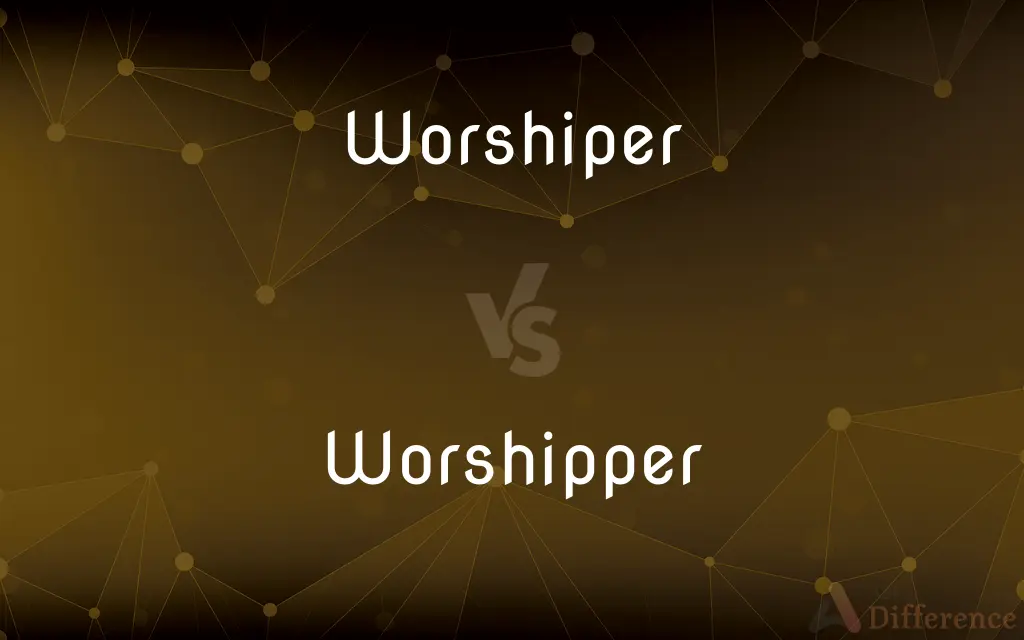Worshiper vs. Worshipper — What's the Difference?
By Maham Liaqat & Fiza Rafique — Updated on April 3, 2024
"Worshiper" and "worshipper" both refer to someone who worships, with "worshiper" being the preferred spelling in American English, while "worshipper" is more common in British English.

Difference Between Worshiper and Worshipper
Table of Contents
ADVERTISEMENT
Key Differences
"Worshiper" is the American English spelling of the noun describing a person who engages in the act of worship, typically in a religious context. This term can be used to refer to individuals participating in religious services, prayers, or other forms of devotion. On the other hand, "worshipper" represents the British English variant of the same term. The difference in spelling reflects broader patterns of variation between American and British English, where British English often retains extra letters in certain words, such as in "colour" versus the American "color."
In American publications and discourse, "worshiper" is more commonly used, aligning with the American English tendency to simplify spellings by omitting redundant letters. This is evident in the preference for simpler, more phonetic spellings in American English. Conversely, "worshipper" is preferred in British publications, educational materials, and religious texts, where the traditional spellings of words are more commonly preserved.
The choice between "worshiper" and "worshipper" does not indicate a difference in meaning or usage beyond the regional spelling preference. Both terms accurately describe individuals who participate in acts of worship, regardless of the religious or spiritual context. The distinction is purely orthographic, reflecting the linguistic variations that characterize American and British English.
While both spellings are correct, the choice between "worshiper" and "worshipper" should be consistent with the variety of English being used. For writers and speakers, this means selecting the spelling that aligns with other linguistic choices reflective of either American or British English conventions. This adherence ensures coherence and clarity in communication, whether the context is religious, academic, or in general discourse.
Despite the difference in spelling, the role and significance of worshipers or worshippers within religious communities are universally recognized. They are individuals deeply engaged in the practice of expressing reverence and adoration, typically towards a deity or higher power. The act of worship is a fundamental aspect of many religious traditions, and those who worship play a crucial role in maintaining the rituals, traditions, and spiritual practices of their respective faiths.
ADVERTISEMENT
Comparison Chart
Definition
A person who engages in the act of worship.
A person who engages in the act of worship.
Spelling Usage
Preferred in American English.
Preferred in British English.
Orthographic Variations
Reflects American English spelling conventions.
Reflects British English spelling conventions.
Meaning
No difference in meaning between the two spellings.
No difference in meaning between the two spellings.
Example Usage
"The worshiper knelt in prayer."
"The worshipper sang hymns with great fervor."
Compare with Definitions
Worshiper
A person who shows reverence and adoration for a deity.
The worshiper attended the early morning service to pray.
Worshipper
A person engaged in worship, especially in a religious context.
The worshippers gathered at dawn to begin their pilgrimage.
Worshiper
Often participates in religious ceremonies and rituals.
Worshipers filled the temple, each in deep contemplation.
Worshipper
Commonly used in contexts requiring British English spellings.
British newspapers refer to religious attendees as worshippers.
Worshiper
Emphasizes the act of showing deep respect or adoration.
The quiet worshiper spent hours in meditation.
Worshipper
Participates in singing, praying, and other forms of devotion.
The worshipper's voice was full of emotion as she prayed.
Worshiper
Can be involved in personal or communal acts of worship.
Every worshiper brought their own candle to the vigil.
Worshipper
Denotes reverence towards a divine figure or entity.
Each worshipper had a personal moment of reflection during the service.
Worshiper
The term is aligned with American English spelling preferences.
American texts typically use worshiper to describe religious devotees.
Worshipper
Reflects a preference for traditional spellings in British English.
Worshipper is the spelling found in many English religious texts.
Worshiper
The reverent love and devotion accorded a deity, an idol, or a sacred object.
Worshipper
The reverent love and devotion accorded a deity, an idol, or a sacred object.
Worshiper
The ceremonies, prayers, or other religious forms by which this love is expressed
A chapel where worship is held daily.
Worshipper
The ceremonies, prayers, or other religious forms by which this love is expressed
A chapel where worship is held daily.
Worshiper
Ardent admiration or love; adoration
The worship of celebrities.
Worshipper
Ardent admiration or love; adoration
The worship of celebrities.
Worshiper
Often Worship Chiefly British Used as a form of address for magistrates, mayors, and certain other dignitaries
Your Worship.
Worshipper
Often Worship Chiefly British Used as a form of address for magistrates, mayors, and certain other dignitaries
Your Worship.
Worshiper
To honor and love as a deity.
Worshipper
To honor and love as a deity.
Worshiper
To regard with ardent or adoring esteem or devotion.
Worshipper
To regard with ardent or adoring esteem or devotion.
Worshiper
(American spelling) worshipper
Worshipper
A person who worships, especially at a place of assembly for religious services.
The temple was filled with worshippers.
Worshiper
One who worships; one who pays divine honors to any being or thing; one who adores.
Worshipper
A person who has religious faith
Worshiper
Someone who admires too much to recognize faults
Worshipper
Someone who admires too much to recognize faults
Worshiper
A person who has religious faith
Common Curiosities
Why does British English often retain an extra "p" in "worshipper"?
British English tends to preserve more traditional spellings, which sometimes include doubling consonants before adding suffixes.
Are there any contexts where one spelling is always preferred?
The choice largely depends on the regional version of English being used; however, individual publications or institutions may have their own style guides.
Does the difference in spelling affect the meaning of the word?
No, the difference in spelling does not affect the meaning. Both spellings refer to a person who worships.
Is there any difference in pronunciation between "worshiper" and "worshipper"?
No, both terms are pronounced the same way, despite the difference in spelling.
Can "worshiper" and "worshipper" be used interchangeably?
Yes, they can be used interchangeably, but it's advisable to stick to the spelling that corresponds with the variant of English (American or British) you are using.
Can non-religious people be considered worshippers?
While typically used in a religious context, the term can also apply to someone with a deep admiration or reverence for something, not necessarily religious.
How should I choose between "worshiper" and "worshipper" in my writing?
Choose based on the variant of English you are using or required to use, keeping consistency with your choice throughout your writing.
Is one spelling more correct than the other?
No, both spellings are correct within their respective variants of English (American and British).
Do other words follow a similar pattern of spelling differences between American and British English?
Yes, many words have different spellings in American and British English, often involving the doubling of consonants, the use of "s" vs. "z", or the inclusion and omission of certain letters (e.g., "colour" vs. "color").
Has the usage of "worshiper" vs. "worshipper" changed over time?
Spelling preferences can evolve, but the distinction between American and British English spellings remains relatively stable.
Share Your Discovery

Previous Comparison
Common vs. Frequent
Next Comparison
Attune vs. TuneAuthor Spotlight
Written by
Maham LiaqatCo-written by
Fiza RafiqueFiza Rafique is a skilled content writer at AskDifference.com, where she meticulously refines and enhances written pieces. Drawing from her vast editorial expertise, Fiza ensures clarity, accuracy, and precision in every article. Passionate about language, she continually seeks to elevate the quality of content for readers worldwide.














































